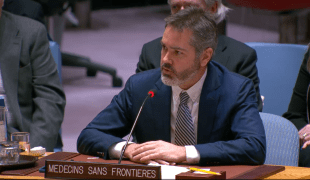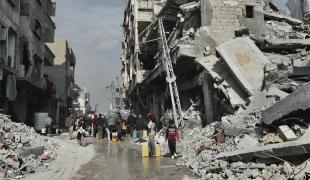Libye : Interviews de deux coordinateurs depuis Benghazi

Anne Châtelain, coordinatrice médicale, et Simon Burroughs, coordinateur de terrain, témoignent de la situation à Benghazi dans deux interviews audio réalisées le 1er mars.
Ecouter l'interview d'Anne Châtelain (Français)
"Dans la ville de Benghazi, la situation paraît normale, les gens travaillent, les gens circulent, il y a de la nourriture dans les magasins d'alimentation. Le soir en général, les gens se regroupent et puis ils klaxonnent pour continuer à montrer leur joie.
L'équipe MSF a rencontré les directeurs d'hôpitaux. Ce qui en ressort, c'est que les structures hospitalières de Benghazi ont reçu 2 000 patients environ. 2000 patients traités dans les structures hospitalières, plus des patients traités en dehors de ces structures. Donc au final, on ne peut pas quantifier le nombre de blessés, mais il y a eu au moins 2 000 blessés pendant les affrontements.
Médecins Sans Frontières est arrivé depuis 4 jours à Benghazi. On a pu rencontrer le comité médical qui coordonne les activités médicales sur place. On a visité les hôpitaux. En fait, les médecins libyens ont pris en charge tous les patients lors de la crise. Ils ont prodigué les soins d'urgence, les interventions. Il ne faut pas oublier que les hôpitaux libyens sont bien équipés et que les chirurgiens sont très compétents.
Il a été demandé à MSF un support en termes de donations de médicaments. Avant la crise, il y avait déjà des ruptures en anesthésiants. Après la phase chaotique, il y a des ruptures en médicaments, notamment anesthésiants et antibiotiques. MSF a pu donner l'équivalent de dix tonnes de médicaments à la pharmacie centrale de Benghazi qui va les redéployer aux hôpitaux en fonction des besoins spécifiques de chaque hôpital. Ce sont des médicaments, donc des antibiotiques, des fixateurs externes pour la chirurgie orthopédique..."
Ecouter l'interview de Simon Burrough s (Anglais)
s (Anglais)
"What MSF has been doing over the last three days is first of all assessing the medical structures in Benghazi town itself. Actually on the journey from the border to Benghazi we also stopped to assess medical facilities in Al Bayda.
And then what we have been doing after since the assessment in Benghazi, we moved to a place called Ajdabyia, which is about 160 km from Benghazi towards Tripoli and had a look at the medical facilities there.
Generally speaking the Libyan health facilities are very well staffed and very well equipped, however over the last few days, they had to deal with quite nasty situations.
They'd never had to deal with this kind of situation in Benghazi ever before so initially they were overwhelmed, I mean, the figures that we are getting from the doctors and from the various hospitals in Benghazi: over a 100 dead and over a thousand wounded.
This is obviously quite a shock to their system, but at the time we arrived on the 25th, they'd managed to deal with this initial influx and were coming back to a phase of normality.
The major priorities for MSF today are to continue to supply medical equipment and supplies as needed. Also, we have a surgeon and an anaesthetist to come and assess some of the surgery cases to see if they need any more intervention.
As the situation develops we'll see what we can provide in terms of support to medical facilities as the country opens up to the West."


